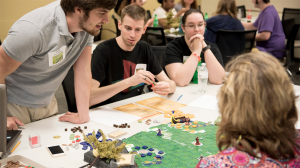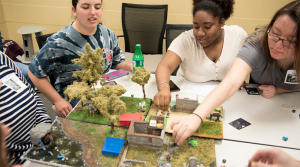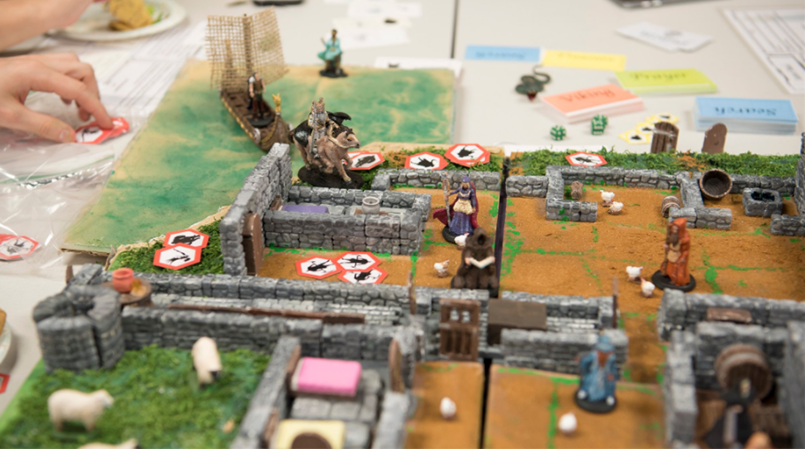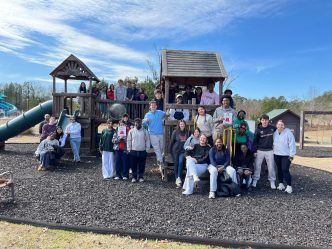When you think medieval Britain, “marketable business skills” probably aren’t the first things that come to mind.
The early Anglo-Saxons (or, rather, the varied peoples we now identify as Anglo-Saxons) weren’t exactly a suit-and-tie kind of culture. They were tribal, skeptical and deeply spiritual—just as prone to battle as they were to barter with the outsiders they encountered. So, what could today’s college students – and more specifically English and Foreign Languages students – hope to learn from them?
A great deal, says Dr. Christina Heckman.
Heckman, an associate professor of English and Foreign Languages, says one of the biggest issues arts and humanities majors face after graduating is not having the ability to articulate their skill set. It’s one thing to tell a potential employer you understand the cultural practices and social norms of an ancient civilization, for example. It’s another to explain that, like the Anglo-Saxons, you can collaborate and carry on a face-to-face conversation with coworkers.

“Being able to articulate that they have communication skills, interpersonal interaction skills—these things are crucial,” Heckman said. “I think we could be more intentional about how we ask students to practice those skills, and I think we need to be more intentional about helping students explain that they have them.”
One of the ways Heckman has tried to accomplish this in her own classroom is by including a hands-on, group-work component to her Studies in Medieval Literature and Medievalism course.
The end result was “Medieval Game Day,” an Anglo-Saxonesque celebration replete with friends, food and finely crafted board games.
It started with a simple idea. Heckman said she wanted to design a class that would introduce students to three of the most important aspects of Anglo-Saxon culture: communication, camaraderie and craftsmanship.
“The Anglo-Saxons were in love with craftsmanship and things made by human hands,” Heckman explained. “My students had done a formal paper earlier in the semester, and I knew I wanted them to do something a little more creative.”
As is the case with many simple ideas, however, the concept of “Medieval Game Day” soon took on a life of its own. Making use of a grant from the Office of Experiential Learning, Heckman set out to create… something.
“I wanted students to work on something from the ground up, to give [students] a chance to really make something that was theirs,” she said. “That said, I had no earthly idea heading into April what it was going to look like.”
Heckman knew she wanted to have students work on a set of games—something easy to pick up and enjoy (for the benefit of friends and visitors) that still conveyed important lessons about Anglo-Saxon culture. Over the course of the semester, students worked on design documents: outlining their game’s playstyle, rules and ultimate objective. While design docs were still flooding in toward the very end of the spring semester, Heckman said the most challenging part—both for her and for students—was actually giving the games life. What would the boards, the characters, the scenery look like?
To answer these questions, Heckman and her students worked closely with other professors across the Summerville Campus. She worked with Brian Rust, professor of Art, to bring students to the sculpture studio to learn the basic elements of small-scale sculpture. The students worked first with Dr. Andy Hauger, Fuller E. Callaway Professor of Physics, then Bill Gray, instructional resource center manager for the College of Education, to learn about 3-D printing and design. Working across campus was necessary to create physical objects for the game, Heckman noted, but it also proved an invaluable lesson to students.

“I wanted them to collaborate with one another on their projects, but I also wanted them to see collaboration,” she said.
To Heckman’s surprise, students not only warmed to the idea of group work. They embraced it wholeheartedly.
“I think every student really got into it, and they all worked together on it,” Heckman said. “Each one got into one thing that they were really good at doing; they became sort of our designated experts.”
One student served as the “master plaster caster.” Another, the class “tree-maker.” One student, Heckman said, even took it upon herself to learn more about 3D printing outside of class, even going so far as to post what she’d learned to Facebook for others to share.
Heckman said it was encouraging to see students “jump in feet first.”
Enjoyable as it was, all group work comes at cost. There were some disagreements. Personality conflicts came up and, once or twice, compromises had to be made. Those, too, proved valuable in their own way.
“Those are inevitable, and part of that is learning to accept and negotiate your way through them,” Heckman said. “That’s a really important skill as well.”
In the end, four groups of students produced four separate games, complete with hand-painted and, in many cases, hand-made characters and scenery. Some were more modern traditional board games, with roleplaying rules and structured playstyles. Others were more freeform, more educational and less restrictive to players. Regardless, all of them were fun and engaging, a quality Heckman ascribes largely to each group’s varied skillsets and points of view.
“If you take any given problem in the world, you’re never, ever going to solve it from one disciplinary perspective,” she said. “We can get into our disciplinary boxes very easily. Showing students that that is the case is very crucial.”
Heckman said she plans to revisit Medieval Game Day. At the moment, she’s still collecting feedback from students: learning what worked and what didn’t. If she were to do it all over again, she said she would—and inevitably will—change some things. When to begin the actual crafting tops the list. Overall, though, she said the class and the celebration it inspired were a tremendous success.
“We could only do so much with the time we had, and it’s sort of a basic exposure to concepts not usually associated with an English program,” Heckman said. “But it’s the kind of basic exposure that gives the students the fundamental skills they need to succeed in whatever line of work they choose.”
 Augusta University
Augusta University




